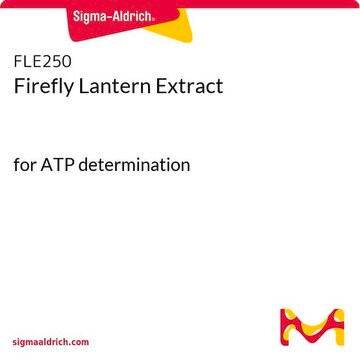R1258
Kpn I from Klebsiella pneumoniae
Restriction Enzyme
Iniciar sesiónpara Ver la Fijación de precios por contrato y de la organización
About This Item
Número de CAS:
MDL number:
UNSPSC Code:
12352204
Productos recomendados
grade
for molecular biology
form
buffered aqueous glycerol solution
concentration
10,000 units/mL
shipped in
wet ice
storage temp.
−20°C
¿Está buscando productos similares? Visita Guía de comparación de productos
Specificity
Recognition sequence: 5′-GGTAC/C-3′
Cutting results: a 2-10-fold Kpn I overdigestion of 1 μg λ DNA substrate results in 100% cutting
Heat inactivation: 65 °C for 15 minutes.
Cutting results: a 2-10-fold Kpn I overdigestion of 1 μg λ DNA substrate results in 100% cutting
Heat inactivation: 65 °C for 15 minutes.
Application
KpnI is a DNA restriction enzyme that is used in molecular biology research to cleave DNA at the recognition sequence 5′-GGTAC/C-3′ to generate DNA fragments with 3′-cohesive termini.
Other Notes
Supplied with 10x Restriction Enzyme Buffer SL (B3782)
Comment: Kpn I shows abnormal DNA cleaving patterns (star activity) in reactions containing high (>5%) glycerol, >5% (v/v); excess enzyme and high pH (>8.0).
The enzyme will not cleave DNA containing 3′-residue of 5-methylcytosine.
The enzyme will not cleave DNA containing 3′-residue of 5-methylcytosine.
Physical form
Solution in 20 mM Tris-HCl, pH 7.5, 0.1 mM EDTA, 50 mM NaCl, 10 mM 2-mercaptoethanol, 50% glycerol (v/v), 0.01% polydocanol (v/v) at 4°C
related product
Referencia del producto
Descripción
Precios
Storage Class
12 - Non Combustible Liquids
wgk_germany
WGK 1
flash_point_f
Not applicable
flash_point_c
Not applicable
Certificados de análisis (COA)
Busque Certificados de análisis (COA) introduciendo el número de lote del producto. Los números de lote se encuentran en la etiqueta del producto después de las palabras «Lot» o «Batch»
¿Ya tiene este producto?
Encuentre la documentación para los productos que ha comprado recientemente en la Biblioteca de documentos.
J Tomassini et al.
Nucleic acids research, 5(11), 4055-4064 (1978-11-01)
We have determined the recognition sequence of the restriction endonuclease KpnI, previously isolated from Klebsiella pneumoniae. The enzyme cleaves the twofold rotationally symmetric sequence (see book for formula) at the positions indicated by the arrows, producing 3' protruding cohesive ends
T Welsch et al.
American journal of physiology. Renal physiology, 281(4), F769-F777 (2001-09-13)
Mice lacking the 80-kDa CD2-associated protein (CD2AP) develop progressive renal failure that starts soon after birth with proteinuria and foot process effacement by unknown mechanisms. CD2AP has been identified and cloned independently by virtue of its interaction with the T
Karel De Gendt et al.
Proceedings of the National Academy of Sciences of the United States of America, 101(5), 1327-1332 (2004-01-28)
Androgens control spermatogenesis, but germ cells themselves do not express a functional androgen receptor (AR). Androgen regulation is thought to be mediated by Sertoli and peritubular myoid cells, but their relative roles and the mechanisms involved remain largely unknown. Using
Jaroslav Jelinek et al.
Epigenetics, 7(12), 1368-1378 (2012-10-19)
Genome wide analysis of DNA methylation provides important information in a variety of diseases, including cancer. Here, we describe a simple method, Digital Restriction Enzyme Analysis of Methylation (DREAM), based on next generation sequencing analysis of methylation-specific signatures created by
Saqib H Ansari et al.
Journal of pediatric hematology/oncology, 35(4), e153-e156 (2013-02-08)
β-thalassemia is characterized by impaired β-chain synthesis leading to ineffective erythropoiesis, severe anemia, and a need for blood transfusion. Presence of Xmn I polymorphism (-158 C-T nucleotide change) in γ-globin gene is associated with a higher fetal hemoglobin and a
Nuestro equipo de científicos tiene experiencia en todas las áreas de investigación: Ciencias de la vida, Ciencia de los materiales, Síntesis química, Cromatografía, Analítica y muchas otras.
Póngase en contacto con el Servicio técnico







